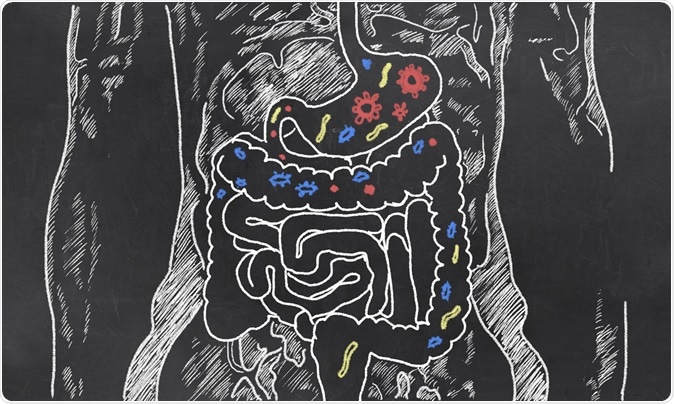A latest study has found that patients with advanced melanoma or skin cancer who had a specific bacteria in their gut had a more favorable response to certain types of cancer treatment or immunotherapy. The study from the University of Texas was published in the latest issue of the journal Science.

Intestines with Gut Bacteria on Blackboard. Image Credit: T. L. Furrer
Out intestines are teeming with certain bacteria that are actually good for our genetal health. These are called microbiome of the body and help in several processes including digestion, absorption of vitamins, immunity and general good health. This new study shows that certain types of bacteria in the microbiome can predict which melanoma patients would respond better with a cancer therapy called the anti-PD-1 therapy that is a immunotherapy that modifies the immune system to work.
For this study the team from Anderson Cancer Center, Texas, collected stool samples from 89 patients who had advanced melanoma that had spread to different organs. They had all been administered the immunotherapy called anti-PD-1 drug. After the first dose, six months were allowed to elapse before their stool samples were collected. The participants were divided into two groups – those who had responded to the immunotherapy and those who had not. Results showed that the microbiome was more diverse with different types of bacteria in those who had responded well to the immunotherapy compared to individuals who had not fared well despite treatment. Those with a diverse microbiome also stayed better for a longer time that those who did not.
Professor Jennifer Wargo, who led the study said that these findings “open up huge new opportunities” and changing the microbiome is not very difficult. They noted that certain bacteria were good for health and having more of them was desirable. This included the family of bacteria called Faecalibacterium and Clostridiales. Those who had these bacteria spent more time without their disease getting worse than those who did not.
Dr Emma Smith from the Cancer Research UK called this research “fascinating” saying that that these bacteria could predict the response to therapy is a novel finding. The team furthered their study by using laboratory mice with melanomas. They took the mice with melanomas and within them transplanted the bacteria from the stool samples of the patients who had failed to respond to the immunotherapy and those who had responded. The results were similar – mice with the gut bacteria from the failed cases failed to respond to the anti-PD-1 drugs and vice versa.
A second part of the study performed at the Gustave Roussy Cancer Campus in Paris, was also published independently in the journal Science. Antibiotics normally kill the helpful gut bacteria. In this second study the researchers gave antibiotics to patients who had non-small cell lung cancer or urothelial carcinoma and who were being treated with the anti-PD-1 drugs. Among the 249 patients, 69 had been prescribed antibiotics just before they began immunotherapy. The antibiotics were given due to infections in these patients that necessitated them. Results showed that taking antibiotics reduced survival.
According to Wargo, these hypotheses had a long way to go before they could be proven and understood. But Smith was optimistic adding, “One of the big challenges for using immunotherapies to treat cancer is understanding which patients will respond, and this research is a step towards helping doctors to identify these people.”
References: